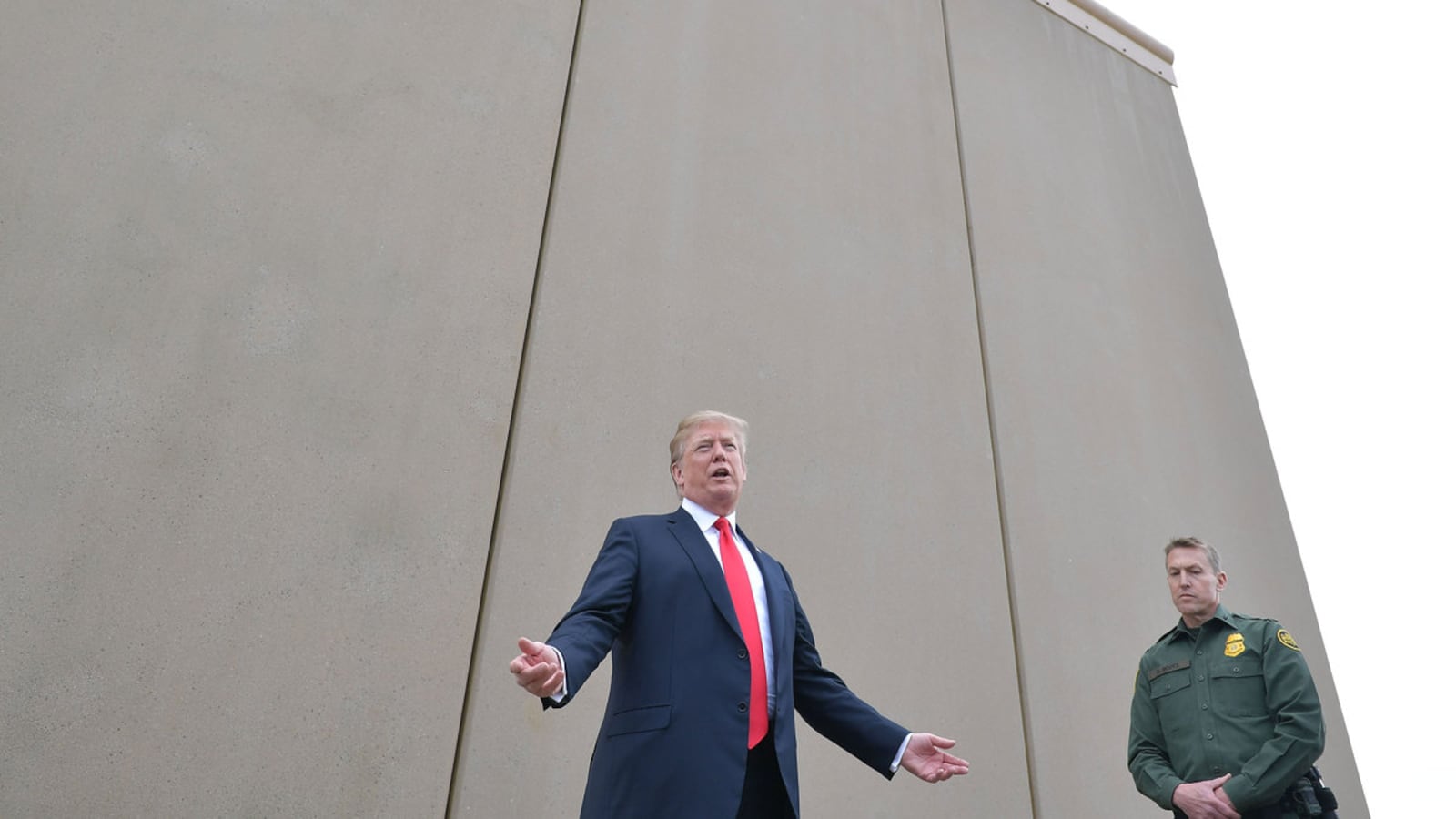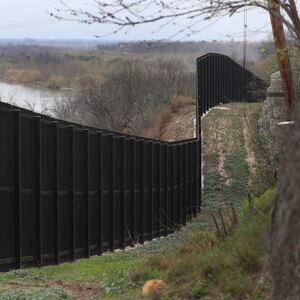More than any other legislative or executive accomplishment, President Donald Trump’s “Wall” along the U.S. southern border stands as a monument to Trumpism and its politics of racial grievance.
Now, only days before the election that could unseat Trump, some immigration rights advocates and legal experts have a message for the man who has promised to dismantle the president’s legacy on immigration: Mr. Biden, tear down this wall.
“Trump’s border wall is just another pretext for targeting immigrants and border communities,” said Dror Ladin, staff attorney with the ACLU National Security Project. “The construction of this unlawful border wall has desecrated tribal lands, leveled wildlife preservations, and destroyed border communities. Every unlawful mile of wall should be taken down, and the government must work with border communities to undo the damage that wall construction has already inflicted.”
Much of Trump’s legacy exists not by law, but by executive order. Much as Trump did with the orders of his predecessor, Biden can reverse many of them at the stroke of a pen. The wall is different. Not only is it a physical fact of the landscape—steel and concrete bisecting 371 miles of land both public and private—but it’s a declaration of something authoritarians always assert: permanence. A prominent scholar of fascism considers the wall something that Biden must destroy, lest he acquiesce to it.
“Biden is obligated to do many things, and this is one of them,” said Jason Stanley, a Yale philosophy professor and author of How Fascism Works. “The wall is merely symbolic. It’s like a Confederate monument. I can see people saying, ‘OK can we not have these symbolic arguments,’ but if you want to address a legacy of xenophobia—little children chanting ‘build that wall’ in front of their Mexican-American classmates—it’s hard to see how you can avoid confronting this symbol of white nationalism.”
The nativism that the wall manifests is deeply rooted in American history, long predating Trump—by the time he took office, U.S. Customs and Border Protection estimated that roughly 580 miles of barrier was already in place along the 1,954-mile continental border with Mexico. Several activists interviewed for this piece noted that precursor authorities for the wall, such as the 2005 REAL ID Act and the 2006 Secure Fence Act passed with bipartisan support, reflecting a longstanding political consensus that either encouraged or acquiesced to nativism rather than confronted it. Biden voted for both bills, although REAL ID was packaged into a much broader spending bill that all 100 Senators voted for.
“It’s been both Democrats and Republicans that have been responsible for the tragedy caused at our borders by the border wall,” said Vicki Gaubeca, director of the Southern Border Communities Coalition. “But we hope Biden can wake up and smell the coffee—not just stop border wall construction, as he has promised to do, but tear it down completely. When we take it down, it should be done in a responsible way that doesn’t further damage the environment.”
Pedro Rios, the director of the U.S.-Mexico Border Program for the American Friends Service Committee, also advocates for “tearing down the border wall” and rescinding the authorities that undergird it. He stressed reckoning with Democratic political decisions that helped pave the way to a wall he wants demolished.
“It’s important for a potential Biden administration to recognize the current harm the Trump administration has done and continues to do with border-wall construction is partially the responsibility of the Democratic Party for voting in favor of these measures 15 years ago,” Rios said.
Not everyone who expresses antipathy for the wall is calling for its destruction. The National Immigration Forum, for instance, isn’t. Its president and CEO, Ali Noorani, called the wall “a distraction that frankly only the margins like to yell about.” While Noorani doesn’t consider the wall effective for border security, he says, “we’re going to stay focused on what are the smart policy [goals]: technology [and] person power on the border to keep bad things out but facilitate the movement of trade, immigration and tourism.”
Though they might agree that the wall is a humanitarian, environmental and legal nightmare for would-be immigrants, landowners and Native American tribes, some advocates say that their primary focus is on the dismantling of the legal and procedural barriers that Trump’s administration has constructed—rather than the literal ones.
“The kind of paper and legal walls that the administration has put up for immigration are perhaps even more nefarious, in many ways,” said Yael Schacher, a senior advocate at Refugees International who foresees a potential Biden administration choosing to starve the barrier of funding and let nature take its course, rather than proactively take most of the barriers down.
“He will get rid of some of the contracts, will stop trying to seize more land, settle these eminent domain lawsuits,” Schacher said. “If you’re gonna start taking the barriers down, I would say it will probably only be in places where there’s been real obvious and serious environmental damage… But I would think it’s going to be like a moratorium, and then change the discourse on asylum and people coming to the border to a more humanitarian approach.”
In his 22-page immigration plan, Biden has pledged to “immediately end Trump’s assault on the dignity of immigrant communities,” and to restore the nation’s “moral standing” by reclaiming America’s history as a safe haven for refugees and asylum-seekers. But he’s stopped short of endorsing tearing down any existing barriers along the border. The Biden campaign did not respond to requests for comments about the wall’s future.
Redirecting the funding for construction of the hardened border barrier towards more effective border enforcement operations, like improved screening at ports of entry, is a key part of that plan—as is Biden’s promise not to construct a single additional mile of Trump’s wall.
“Building a wall from sea-to-shining-sea is not a serious policy solution—it’s a waste of money, and it diverts critical resources away from the real threats,” Biden’s position paper on immigration states.
But even with the rescission of Trump’s “remain in Mexico” policy and the reopening of ports of entry for those seeking asylum that Biden has promised, advocates say, there are legitimate humanitarian concerns about the border wall as a permanent obstacle on the U.S. southern border.
“If you have more barriers erected at common crossing points, you force people to cross in much more dangerous regions,” said Gregory Chen, the senior director of government relations at the American Immigration Lawyers Association. “That means people who are suffering extremes of temperature, dehydration, are severely traumatized, if not experiencing death in the efforts to cross over in the United States.”
The wall has yet to come to the port city of Laredo, but residents see its imminent encroachment. A month ago, Customs and Border Protection and the U.S. Army Corps of Engineers announced two contracts for construction in Laredo. One of them, for over $280 million, went to the Trump-connected firm Fisher Sand and Gravel. Laredo resident Melissa Cigarroa owns land in neighboring Zapata County on which the government has expressed interest in building the wall.
But to Cigarroa, who is a member of the No Border Wall-Laredo Coalition, the larger obscenity is what the wall means for Laredo’s culture.
“It’s always been this international community. Nuevo Laredo, across the river [in Mexico], has always been part of the family. Still today a lot of families have family members on the other side,” she said. “It’s very painful because it separates a lot of families. It’s just such an insult and an attack on our heritage and our identity.”
With Laredo under imminent threat of wall construction, Cigarroa’s immediate goal is for Biden to sign a Day One executive order codifying his no-new-wall-construction pledge. (“I would accept Day Two,” she allowed.) But she wants the whole thing gone. “It’s incredibly destructive to those ecosystems, it’s tearing through First Peoples’ lands that are ancient and sacred,” Cigarroa said. “In the Rio Grande Valley, it’s separating neighborhoods on the southern part of the wall, as if we’re ceding them to Mexico.”
Yale’s Stanley urged Biden to not only dismantle the wall, but fold the dismantling within a “larger education campaign to explain the toxic forces that the Trump administration released, which were already present in the American body politic,” he said. “If we let them simmer, the next Trump will be worse.”







